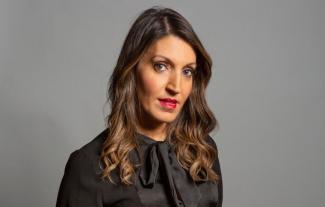MP opens up about stammering

Labour's Dr Rosena-Allin Khan spoke about growing up with a stammer on ITV's Loose Women yesterday.
The MP for Tooting appeared on the live lunchtime talk show to talk about her experiences with stammering. In the interview, which you can watch below, Rosena explained how suffering a significant childhood trauma led her to start stammering when she was around 7 and 8, and later in secondary school.
"Just talking about it now makes me feel very vulnerable because I've never spoken about it publicly before," she said. "I really struggled to get words out, words that began with certain letters". Later in the conversation she added, "I don't think I really knew what was going on or why it was happening. I just knew that I was afraid to speak and that speaking didn't come easily".
Article continues below...
When describing what it was like at school, Rosena said, "I was bullied quite badly with things like reading out loud in class. I was really sporty so back in the day they would pick people to be captain… I would traumatically have to point to the people and say their names, so I'd always try and pick people whose names didn't begin with a C or a T or a P because I couldn't say words with those letters".
But for me it was really so important — not to say 'Hey, that was then and look and me now, I'm all better'. It's about saying how can we create a tolerant society where it's normal to live like that?
When asked how people reacted to her stammer, Rosena replied, "Pretty poorly, because people don't understand. There's a lot of stigma around having a stammer… people in shops would roll their eyes, walk away in the middle of my asking for something because it would take me so long. When I would try and use the phone people would hang up because they would wonder what the strange noise was, and I think it was just very, very difficult because people assumed I was nervous and I wasn't. People who stammer aren't necessarily nervous".
Although she speaks more fluently now, it's something that still affects Rosena, as she explained: "I'm in parliament sometimes and I'm standing at the dispatch box… and sometimes I look at my speech and I see certain letters and even now I think to myself 'shall I change the sentence so that I don't feel scared saying that letter?' All these years later, because the scars don't leave you when you're treated a certain way. But what I should be thinking is: do you know what, it doesn't matter, because I'm in a space where, even if I am disfluent, even if I do stammer right now, then I'm not going to be judged".
Messages
"Never would I have thought for a million years that I would be able to speak with fluency," the former Shadow Minister for Mental Health said before pointing out: "But for me it was really so important — not to say 'Hey, that was then and look and me now, I'm all better'. It's about saying how can we create a tolerant society where it's normal to live like that?" She later suggested how that might be achieved: "I do really genuinely think that if we had more presenters, more actors and actresses, more people in school as teachers, who had disfluency, who had a stammer, it would normalise it for all the people that have one".
When one of the panel members asked Rosena the best things people can do when talking with someone who stammers, she answered, "It's important to just be patient and to let them finish speaking and make them feel as though they are welcome in that space. Then I think it's really important to understand that people who stammer are not victims, they're not suffering from having a stammer, you are not debilitated. It should be accepted as a normal part of life, a normal way to live".
If you stammer too and would like to talk about it, call our free, anonymous helpline on 0808 802 0002 or start a webchat.

































